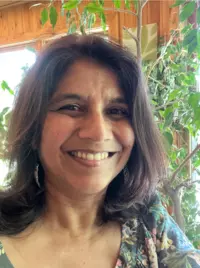Shamili Ajgaonkar
Professor of Biology and Field Studies; Faculty Chair for Global Education, College of DuPage
About Me
I grew up in Mumbai, India where, despite the very urban environment, I developed a love for nature and the outdoors. I came to the US as a young 21-year-old to study environmental biology. I spent 7 years in upstate New York and eventually moved to the Illinois in 1992. Today, I would describe myself as a global, interdisciplinary, environmental biologist. I am a professor of biology at the College of DuPage (a community college in the west suburbs of Chicago) and have been teaching here for 30 years now. Environmental biology and sustainability are my passion!
Besides my work and family, I continue to enjoy outdoor activities such as hiking, observing wildlife, gardening, and traveling.
Focus of current FEW-Nexus-based education work
In my view, the vision of NC-FEW is to use the lens of the food-water-energy nexus to engage with and address significant global challenges that exist at the intersection of human and natural systems. This approach is at the core of what and how I teach in my non-majors environmental biology course.
Not only is environmental science inherently interdisciplinary, it is also global in its scope as it requires much more than just an awareness of how the environmental consequences of our actions affect us personally. Think globally, act locally is a succinct way to explain that through the study of environmental science, students should develop the ability to critically examine trade-offs. Environmental problems are largely transboundary problems, and students need to understand how our individual and collective choices can have disproportionate effects on communities that did not contribute to the problem. Students also need to learn how our actions contribute to social traps that discount the future, and to examine whether long-term costs to future generations are worth short-term gains. To this end, early in the semester students calculate their personal ecological footprints (https://www.footprintnetwork.org/) and compare their footprints to those of both other nations and the fair-share footprint to reflect on equity and justice in natural resource use.
An experiential learning approach is vital as hands-on education is what truly educates. To this end: to understand the water cycle I take students on a trip to a sewage treatment plant, to explore food issues we visit a local living history farm, and to learn about renewable energy we see how solar panels work. Civic engagement is critical as well. In the environmental biology class, students commit to engaging in a sustainability challenge over the course of the semester to connect the course content to their everyday lives in a direct and meaningful way. I use both the Pathways for Public Service and Civic Engagement ( https://haas.stanford.edu/about/our-approach/pathways-public-service-and-civic-engagement) and the Global SDGs (https://sdgs.un.org/goals) as the framework to help students understand the breadth of civic engagement and design a sustainability challenge that connects the local to the global.
Education should help harness our creative abilities to learn to live on a crowded planet. Thus, I encourage students to critically analyze the meaning and place of ecological systems in human society as they explore solutions to solve pressing environmental challenges. Ultimately, solving the environmental crisis is about making a meaningful place for nature within global society, and students (especially if they do not plan to study environmental science beyond this one non-major class) need to learn how they can become part of the solutions that holistically benefit ecology, society, and economy.
FEW-Nexus-based education experience, expertise and interests
Teaching environmental science to non-majors presents both a challenge (lack of interest and motivation) as well as an opportunity (to help students understand why environmental and scientific literacy matter). I try to focus on what education about the environment is for, and to connect it to the daily lives of students by engaging them in interdisciplinary thinking, experiential learning, and civic engagement. I have taught environmental science courses in various modes of delivery including traditional classroom, online, field-based and in interdisciplinary learning communities in which I co-teach with a colleague from a different discipline. Besides my teaching and curriculum work I have also co-directed several projects to forward environmental and civic engagement at the College. One such project is the Food Security Initiative, which seeks to cultivate and provide nutritious food through a campus garden and food pantry, and to engage and educate students and community members through academic study and direct participation in issues related to food justice. This range of teaching approaches, particularly of non-majors in a community college setting, is what I see as being my main contribution. I would be interested in collaborating with others interested in curricular matters and contributing to developing educational resources: be they classroom activities, course and program models, interdisciplinary curricular frameworks, or other effective ways to use the FEW-Nexus in education.
Publications, presentations, and other references
- Adelman, Deborah and Ajgaonkar, Shamili. From Food Security to Food Justice to Civic Engagement: Building an Interdisciplinary Critical Pedagogy. In: Food Justice Activism and Pedagogies: Literacies and Rhetorics for Transforming Food Systems in Local and Transnational Contexts; Eileen E. Schell, Pritisha Shrestha, and Dianne Winslow, (editors); Lexington Books International, 2023
- Adelman, Deborah and Ajgaonkar, Shamili. From Corn Mother to King Corn: Contested Narratives in the Era of Climate Change. In: Food, Environment, and Climate Change: Justice at the Intersections; Erinn C Gilson and Sarah Kenehan (editors); Rowman & Littlefield International, 2019
- The Pathways Practitioner Profiles Research Project


![[creative commons]](/images/creativecommons_16.png)